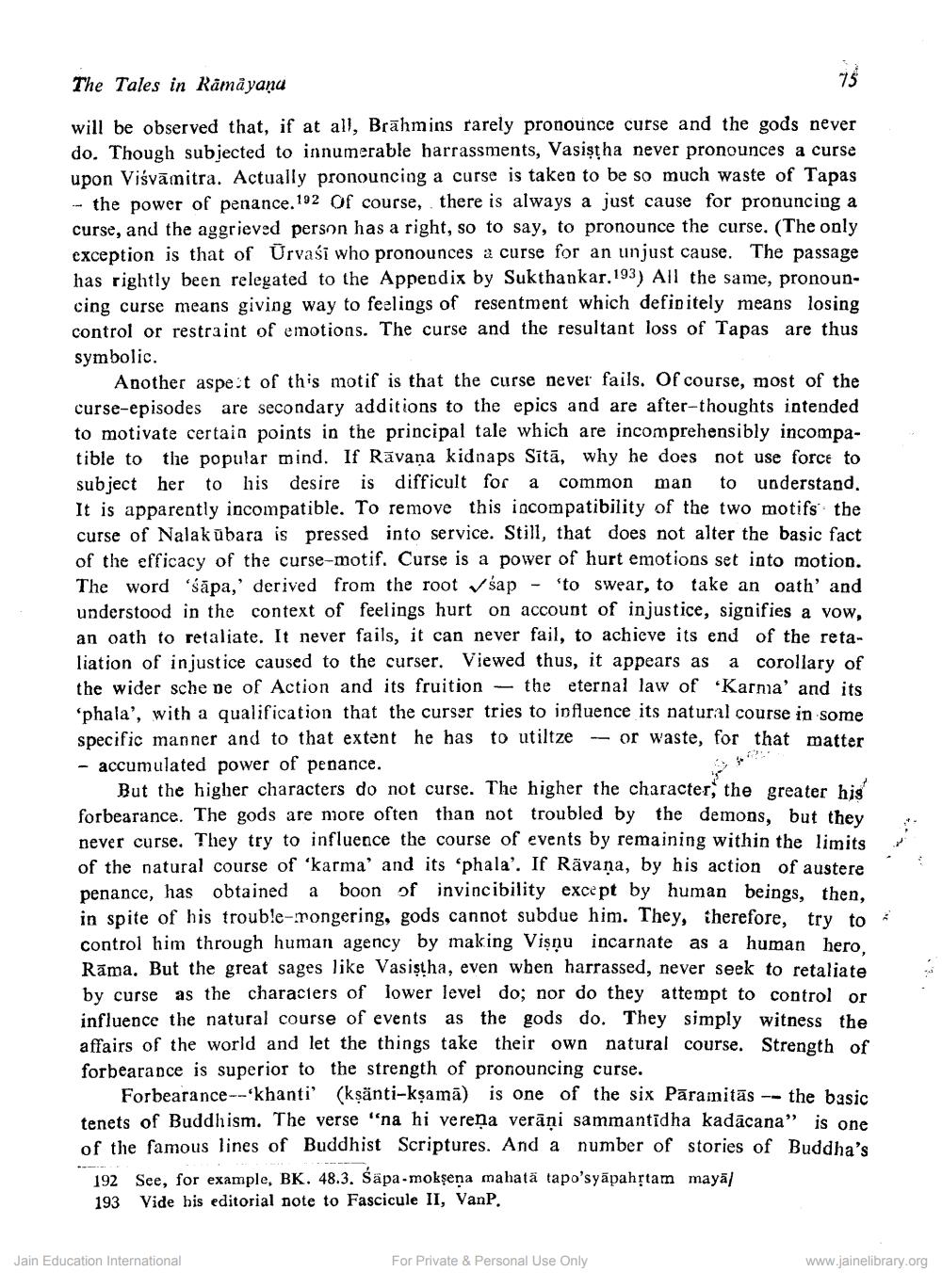________________
The Tales in Rämä yaņa
will be observed that, if at all, Brāhmins rarely pronounce curse and the gods never do. Though subjected to innumerable harrassments, Vasiştha never pronounces a curse upon Viśvānitra. Actually pronouncing a curse is taken to be so much waste of Tapas - the power of penance.192 Of course, there is always a just cause for pronuncing a curse, and the aggrieved person has a right, so to say, to pronounce the curse. (The only exception is that of Urvasi who pronounces a curse for an unjust cause. The passage has rightly been relegated to the Appendix by Sukthankar.193) All the same, pronouncing curse means giving way to feelings of resentment which definitely means losing control or restraint of emotions. The curse and the resultant loss of Tapas are thus symbolic.
Another aspet of this motif is that the curse never fails. Of course, most of the curse-episodes are secondary additions to the epics and are after-thoughts intended to motivate certain points in the principal tale which are incomprehensibly incompatible to the popular mind. If Rāvana kidnaps Sītā, why he does not use force to subject her to his desire is difficult for a common man to understand. It is apparently incompatible. To remove this incompatibility of the two motifs the curse of Nalakūbara is pressed into service. Still, that does not alter the basic fact of the efficacy of the curse-motif. Curse is a power of hurt emotions set into motion. The word 'śāpa,' derived from the root sap - 'to swear, to take an oath' and understood in the context of feelings hurt on account of injustice, signifies a vow, an oath to retaliate. It never fails, it can never fail, to achieve its end of the retaliation of injustice caused to the curser. Viewed thus, it appears as a corollary of the wider sche ne of Action and its fruition — the eternal law of Karma' and its ‘phala', with a qualification that the curser tries to influence its natural course in some specific manner and to that extent he has to utiltze -- or waste, for that matter - accumulated power of penance.
But the higher characters do not curse. The higher the character, the greater his forbearance. The gods are more often than not troubled by the demons, but they never curse. They try to influence the course of events by remaining within the limits of the natural course of ‘karma' and its phala'. If Rävaņa, by his action of austere penance, has obtained a boon of invincibility except by human beings, then. in spite of his trouble-Irongering, gods cannot subdue him. They, therefore, try to control him through human agency by making Vişņu incarnate as a human hero Rāma. But the great sages like Vasiştha, even when harrassed, never seek to retaliate by curse as the characters of lower level do; nor do they attempt to control or influence the natural course of events as the gods do. They simply witness the affairs of the world and let the things take their own natural course. Strength of forbearance is superior to the strength of pronouncing curse.
Forbearance--khanti' (kşänti-kşamā) is one of the six Pāramitās -- the basic tenets of Buddhism. The verse "na hi verena verāņi sammantidha kadacana” is one of the famous lines of Buddhist Scriptures. And a number of stories of Buddha's 192 See, for example, BK. 48.3. Sapa-moksena mahatä tapo'syāpahstam mayā/ 193 Vide bis editorial note to Fascicule II, VanP.
Jain Education International
For Private & Personal Use Only
www.jainelibrary.org




